Jewish Family Services of Delaware (JFS), the only refugee resettlement agency in the state of Delaware, is in close and consistent contact with state officials and national partners at HIAS regarding our state’s response to the crisis in Afghanistan. While no Afghan cases have been assigned to JFS Delaware’s Refugee Integration Support Effort (RISE) yet, the agency is scaling up significantly as we prepare to accept SIV (Special Immigrant Visa) and other refugee cases should they be called on to do so. Support from individuals, state and county representatives, faith-based organizations, local congregations, community volunteers, and other partners (landlords, employers, etc.) is crucial to ensuring the successful integration of these families seeking refuge in our state. We are all working closely together in anticipation of new arrivals.
Wednesday, November 10
JFS Delaware is now assigned and expecting at least 30 Afghan individuals to arrive before the end of this year—25 of them are already here and getting settled into their new homes—and it is very likely even more will be assigned to our state in the new year or sooner. These individuals and families will need a lot of support and help to rebuild their lives in Delaware, integrate into our community, and achieve self-sufficiency. Right now, the best way to help them and JFS is by making a donation, which you can designate to RISE (our Refugee Integration Support Effort); these funds go directly towards meeting refugees’ basic needs—food, clothing, housing, translation services, transportation, education, and more—as well as supporting our RISE team while they coordinate all of these critical efforts. Thank you in advance for your support!
Friday, October 15
JFS Delaware is currently assigned 4 Afghan families (a total of 6 adults and 7 children) and we are eagerly anticipating their arrival before the end of this year. The Afghan family we previously announced below and were expecting this month (single mother with 3 sons) was reassigned to another resettlement agency due to them having personal family ties closer to that city; it is critical for refugees to have a support system while they orient to their new community and we wish them the best on their continued journey. Please keep in mind the quickly-changing and short-notice nature of this work—sometimes travel and arrival dates change, sometimes we are notified of cases that are ultimately reassigned to other resettlement agencies, sometimes we are given less than 48-hours’ notice before a family’s arrival—and know that we appreciate everyone’s flexibility, support, and generosity to prepare warm welcomes for every refugee coming to Delaware.
Monday, September 20
We are very pleased to share that JFS has been assigned our first Afghan case, which includes a single mother and her three sons (ages 16, 13, & 8). They speak Dari, with little to no English. We are immeasurably grateful for the interfaith collaboration of Congregation Beth Shalom, Westminster Presbyterian Church, Tarbiyah School, and the Islamic Society of Delaware for wrapping their arms around this family when they arrive (date TBD)—all of their needs, including housing, food, clothing, healthcare connections, and other supports will be provided in full until they are settled, well-oriented, and self-sufficient.
Friday, September 3
JFS’ RISE team and staff are scaling up and preparing to provide support for 10 Afghan families or up to 30 people between now and early 2022. These numbers are in addition to the 50 refugees JFS was already planning to receive throughout the year from locations around the world (In August, JFS welcomed a Rwandan family of 3; this month, we are anticipating a family of 5 from Jordan.)
JFS Delaware, an over 120-year-old organization, has a long history of welcoming and assisting newcomers to America. In the 1980’s JFS was instrumental in resettling hundreds of families in Delaware from the former Soviet Union and, since 1997, have been providing émigré services for refugees who have already arrived in the state. In 2016, the organization relaunched active resettlement efforts through their Refugee Integration Support Effort (RISE). In 2017, JFS welcomed an SIV from Afghanistan and his family – view their story HERE. Learn more about RISE at www.jfsdelaware.org/refugees
(JFS Delaware is an affiliate of HIAS, on of the nine national resettlement agencies.)
By: Wendell Covell, LCSW
Director of Program Operations & Training
Social work is more than a profession. It’s a lifestyle dedicated to serving others and committing to constant self-improvement along the way. We operate under the highest set of standards to ensure quality care for everyone we serve.
Social workers show up every day, dedicated to being the change and uplifting the community. Whether it’s a pandemic, social injustice, a natural disaster, or a crisis in the community, you can count on social workers answering the call.
Social work interns have chosen to put their all into this work by pursuing a profession which demands countless hours of supervision, rigid licensing requirements, constant practice, and classroom learning. We take that seriously at JFS and work as hard as our interns do to show up and provide them the experience they are seeking. It means a lot to us to be part of their journey, knowing we are the foundation for the work they do for the rest of their careers. It’s a chance for us to influence the impact our students will have and a time where we get to teach them what it means to be a compassionate professional in this field.
Meet some of JFS Delaware’s interns below:
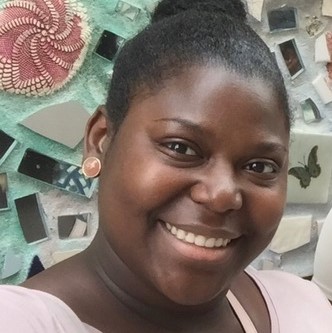 Jada Carwell
Jada CarwellStudying at Delaware State University
JFS Program(s): Therapeutic Support for Families
What is the most valuable thing you’ve learned during your internship?
I have learned that all people—of all backgrounds—need help.
What do you find most fulfilling about the work you do?
Witnessing growth in the people I help.
What does giving back mean to you?
Charitable giving, donating time, and sharing knowledge.
Share your favorite quote.
“It’s not about what you say, it’s about how you say it.” —Carol Carwell
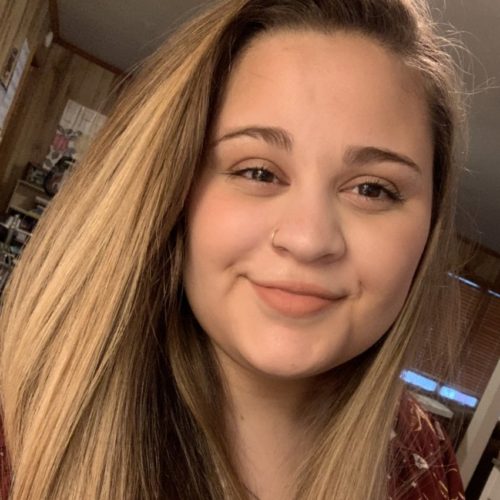 Ellen Durham
Ellen DurhamStudying at Rutgers University
JFS Program(s): Older Adults
Why were you drawn to working with a nonprofit like JFS?
The team culture at JFS is inclusive and supportive.
What is the most valuable thing you’ve learned during your internship?
The importance of supporting not just clients, but their caregivers and loved ones.
What does giving back mean to you?
Offering your knowledge and helping people on or beyond your team.
Share your favorite quote.
“In the darkest times, hope is something you give yourself. That is the meaning of inner strength” —Iroh, Avatar the Last Airbender
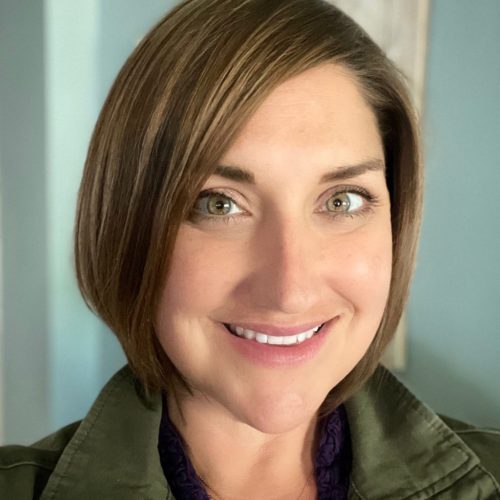 Rebekah Mo
Rebekah MoStudying at Delaware State University
JFS Program(s): Older Adults, Maternal Mental Health, Community Based Counseling at Albert Einstein Academy
Why were you drawn to working with a nonprofit like JFS?
I believe mental healthcare should be accessible to all.
What do you find most fulfilling about the work you do?
Seeing the strength and resilience of my fellow humans.
What does giving back mean to you?
Seeing a need and turning toward that need with love and compassion.
Share your favorite quote.
“I’ve learned that people will forget what you said, people will forget what you did, but people will never forget how you made them feel.” —Maya Angelou
 Reba Rager
Reba RagerStudying at Widener University
JFS Program(s): Counseling Intake
Why were you drawn to working with a nonprofit like JFS?
The emphasis placed on creating space for everyone to find their voice and strengths.
What do you find most fulfilling about the work you do?
Watching people take back control of their lives.
What does giving back mean to you?
It means helping and empowering those around you to live a happier life.
Share your favorite quote.
“The time is always right to do what is right.” —Martin Luther King Jr.
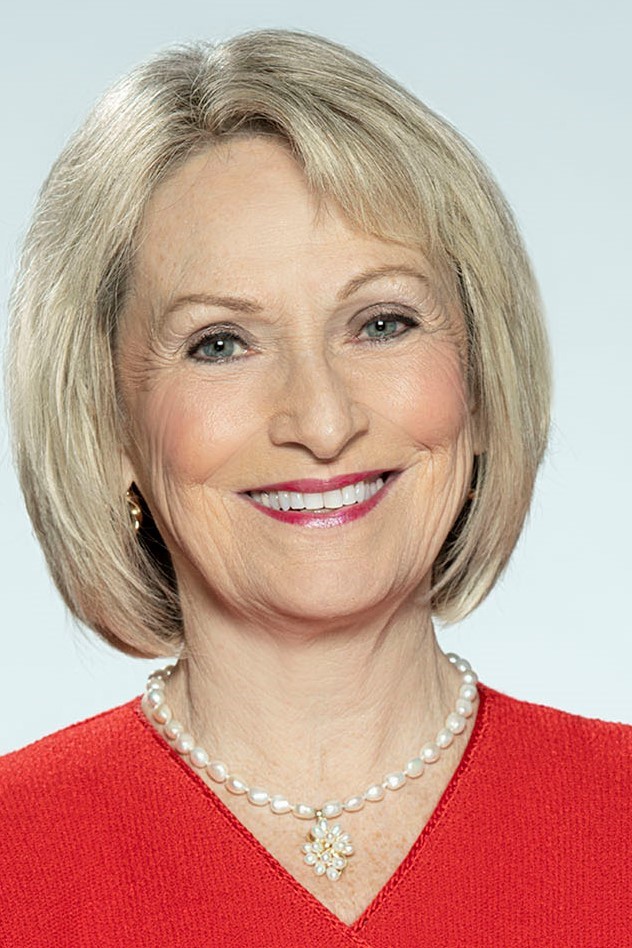
Written by: Anne Eidschun, Certified Senior Advisor
and Director/Owner of Griswold Home Care
Does the thought of having a stranger in your home give you an uneasy feeling? Well…you are not alone. These feelings are real and that is why it is advantageous to learn about home care and the industry before the immediate need for it arises. Self-care, health, and safety are important at any age, but with maturity comes the possibility of needing external care with very little notice. Choosing who provides that care is important and personal, and you cannot make such a decision without information. If possible, gather information about the various agencies proactively rather than signing up for services in the middle of a crisis. Choosing the agency is only the first step. How you make this a meaningful and positive experience is even more important to ensure you receive the level of care and compassion you would give yourself.
Here are my recommendations for how to build a successful relationship with your home care agency.
You may feel awkward having a stranger in your home, but I am reminded by something my father always used to say: “Even a thin pancake has another side.” It can be awkward for the caregiver because, beside some basic information, they have no idea what they are walking into when they knock on your front door. It’s equally important to let the caregiver know about you and orient them to your home. Set boundaries but remain open to communication.
This will help avoid conflicts if several family members are giving directions to the caregiver or agency and help ensure the communications are received and responded to in a timely manner. You should expect communication with the caregiver to be frequent and thorough—this is the key to fewer misunderstandings.
It’s important to feel that your caregiver is a good match for your situation. Being responsive to communication and feeling comfortable expressing dissatisfaction are critical to ensuring a good relationship with your caregiver. And if you are having issues, do everything possible to have a face-to-face meeting with the agency scheduler or owner to try to resolve the issues; don’t just jump ship and go to another company if you are having a problem. Making a change can be stressful and you want to be certain you are making the switch for the right reasons.
Everyone wants consistency with the same caregiver. If you have regularly scheduled care, you may want to think longer term. A long-range plan is one that includes developing a team of caregivers so you know a few in case one gets sick, moves, etc.
The concept of permission is sometimes important to caregivers. Others will take more initiative. Give the relationship time to develop. When you decide to interview and work with an agency, it is never an irrevocable decision. You have every right to make a short-term commitment, re-evaluate, and then change your original plan. It is your plan and any agency you employ is there to serve your needs.
Griswold Home Care is committed to providing compassionate home care and working with our professional and resourceful partners in the community such as Jewish Family Services of Delaware. Agencies like JFS help many older adults find the support they need to assist themselves or their loved ones in navigating home care needs.
Sometimes the best way to care for yourself is to seek care from someone else.
Learn more about Griswold Home Care at GriswoldHomeCare.com/New-Castle-County
Looking for personalized aging support? Consider JFS Delaware’s Care Navigation services, which include assessment & care planning, care management & advocacy, transportation assistance, and much more.
Women of every culture, age, income, and race experience perinatal mood and anxiety disorders (PMADs). PMADs are the primary complication of pregnancy, childbirth, and up to twelve months postpartum, with over 500,000 women diagnosed with postpartum depression each year in the United States. Yet, with the necessary mental health care options often limited to well-resourced families, 75% of women diagnosed with PMADs do not—or cannot—get treatment; symptoms and barriers to care are exacerbated for women of color by the stressors of poverty and systemic racism in health care settings.
Angelina Spicer is no stranger to these statistics. The comedian, mother, and “accidental activist” became an outspoken advocate for maternal mental health after her own postpartum depression diagnosis and subsequent hospitalization. Spicer has since engaged in advocacy efforts in California and is now leading a nationwide initiative for legislation on Capitol Hill.
Using comedy and personal experience, Angelina is sparking conversations across the country about maternal mental health and the need for affordable, accessible care for all moms. Spicer is traveling on a #PostpartumRevolution Tour, a mission to educate the public about postpartum depression and advocate for substantive support. While in each city, Angelina is meeting with legislators, local leaders, healthcare professionals, and women who want to share their stories, filming along the way for her upcoming documentary, The Push for Permission.
On Tuesday July 13th, Angelina Spicer visited Delaware, hosted by Jewish Family Services of Delaware (JFS), for a day of awareness, advocacy, connection, and—of course—comedy.
The morning began with an intimate breakfast reception for JFS’ partners and most avid supporters to witness and celebrate the announcement of the Sonia Schorr Sloan Maternal Mental Health Program, learn about the need for such services in Delaware, and pledge their support to JFS’ newest initiative. The day swiftly continued with advocacy and partnership meetings including Congresswoman Lisa Blunt Rochester and Lt. Governor Bethany Hall-Long.
“Maternal mental health throughout the country is a crisis,” affirmed Blunt Rochester. “That’s why I’ve been proud to work in Congress to make sure mothers have the resources they need, both during pregnancy and after birth . . . It was a pleasure to join Angelina Spicer and JFS Delaware to highlight the important work they do throughout the state and talk about ways we can improve maternal mental health outcomes in Delaware.”
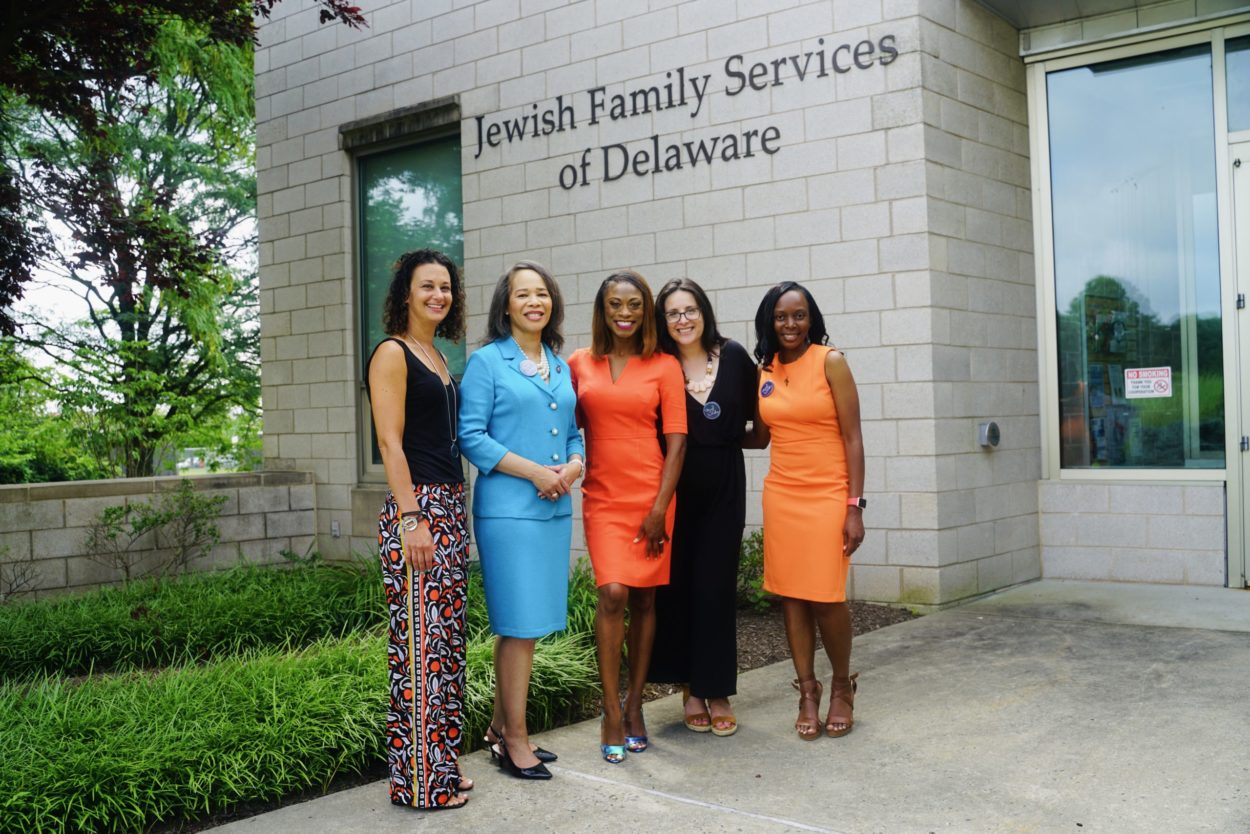
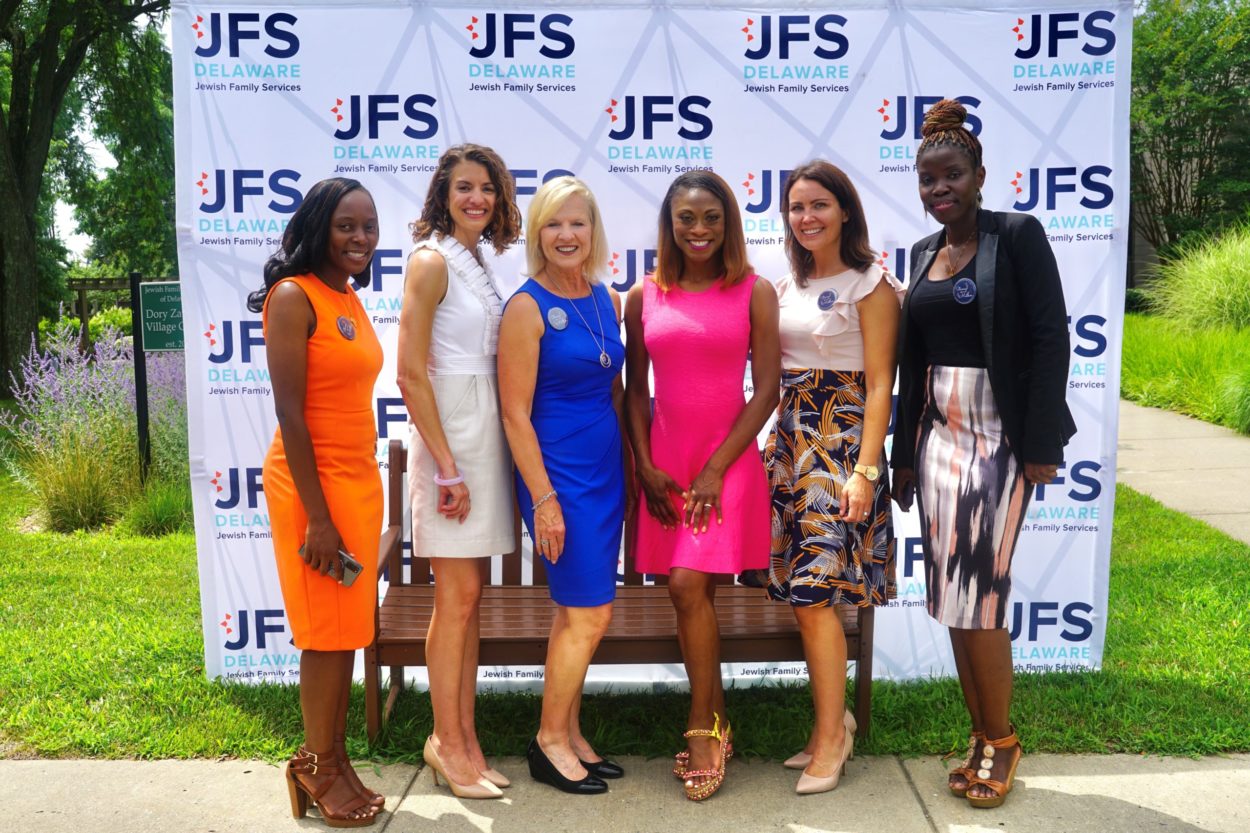
Angelina also had an opportunity to meet licensed professionals from Nemours Children’s Health System and ChristianaCare’s Center for Women’s Emotional Wellness, who are JFS’ primary partners in identifying and addressing maternal mental health needs in Delaware.
JFS also introduced Angelina to the impassioned leaders of Black Mothers in Power—a group dedicated to eradicating racial health disparities for Black birthing people and Black babies in Delaware— and facilitated meaningful conversations with moms from our own community who have personally experienced postpartum or perinatal challenges.
The second half of the day brought Angelina and her crew to the Riverside community, specifically the state-of-the-art Teen Warehouse, where she met with leaders of The WRK Group (The Warehouse, REACH Riverside, and Kingswood Community Center); together they discussed the importance of healthcare accessibility to marginalized, underserved, and underrepresented communities.
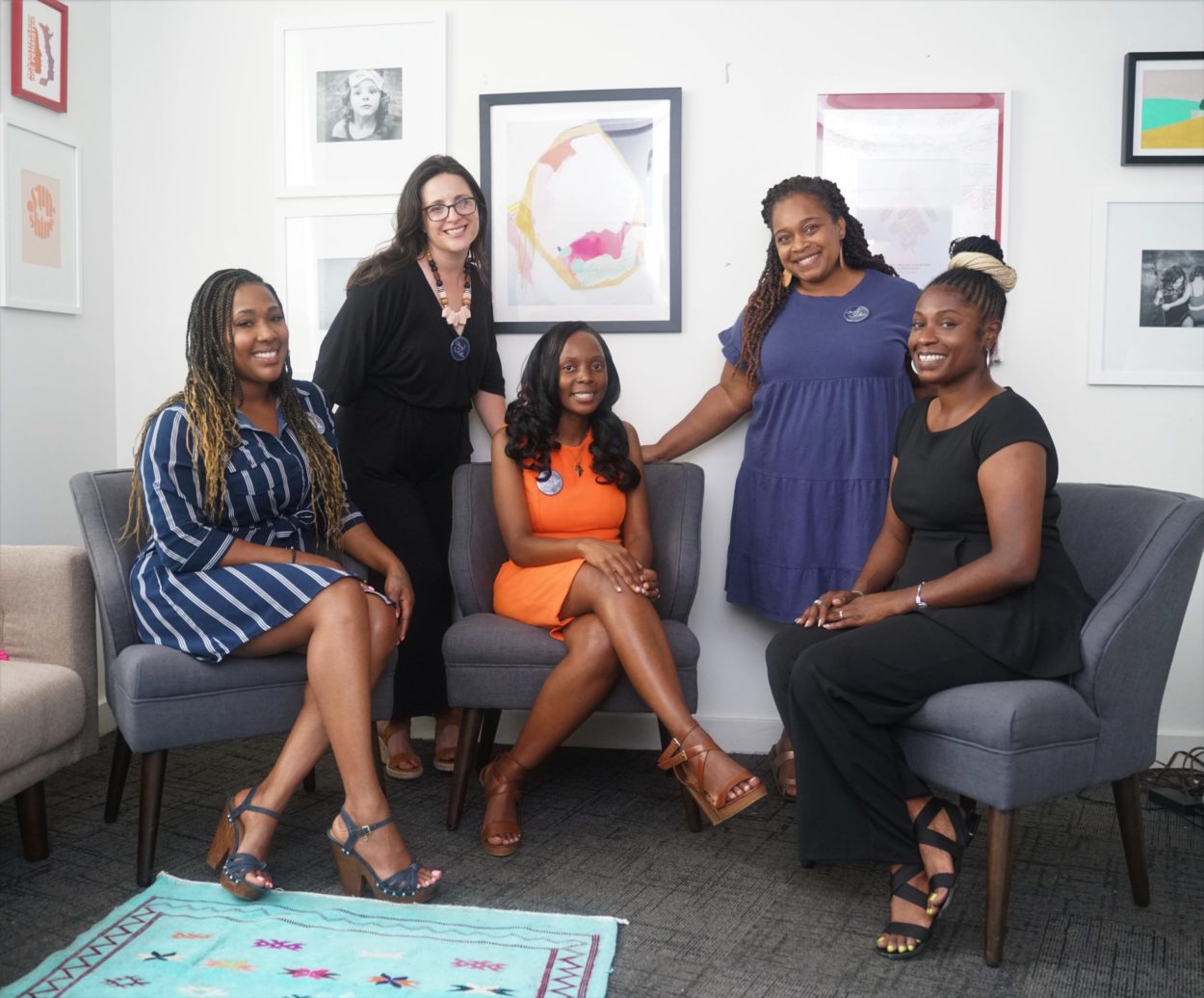

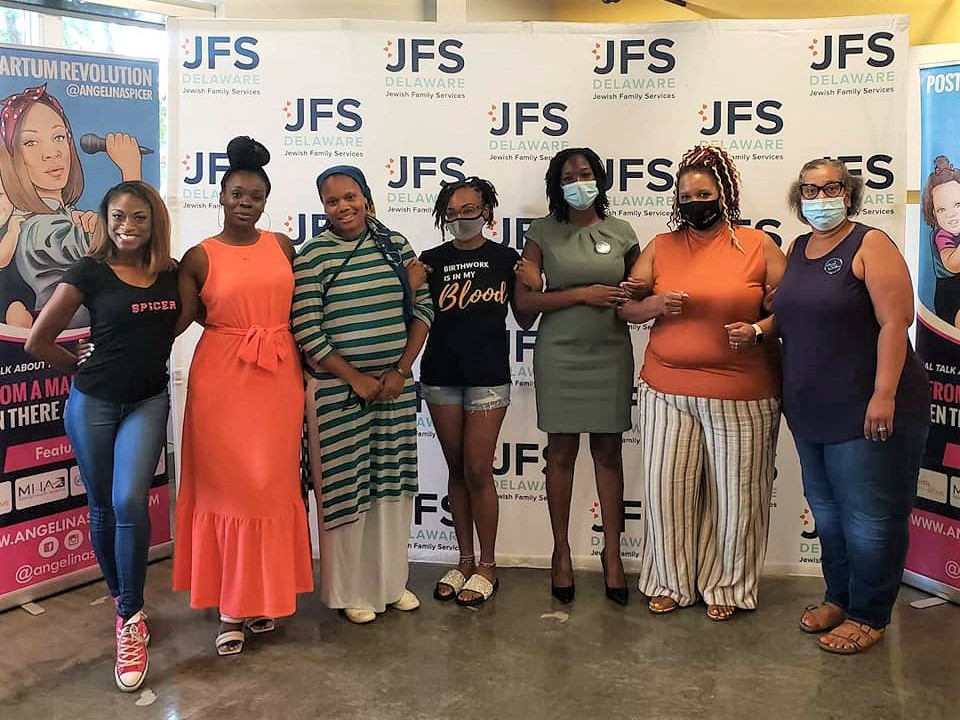
“Mental Health is a key value of The WRK Group and something we intentionally incorporate into all our service offerings,” shared CEO, Logan Herring. “We are grateful to Angelina for bringing this conversation around postpartum mental health to the Riverside community and including many of Wilmington’s female leaders in the dialogue. The WRK Group is excited to continue its partnership with JFS and creating a better, safer, and kinder Wilmington for everyone.”
While the day ended on an inspiring note—discussing the work already being done with local healthcare professionals, therapists, birth workers, doulas, and activists—the fact remains, in Delaware, there are fewer than ten licensed providers who accept most insurances and possess the specific advanced training to address postpartum mental health concerns. This means there is just one trained, insurance-approved, licensed therapist for every 1,500 Delaware moms, not including women who have suffered perinatal loss.
To help remedy this situation, JFS Delaware will work with ChristianaCare’s Center for Women’s Emotional Wellness and Nemours Children’s Health System to establish a foundational cohort of licensed professionals to be trained by Postpartum Support International (PSI) and subsequently identify, screen, and treat mothers in need. JFS will also work closely with the PSI-Delaware Chapter to support women’s health professionals, Delaware hospitals and clinics, pediatricians, doulas, area experts, and organizations seeking referral sources and educational resources.
All women—regardless of background, income, or health insurance status—should have equal access to and receive the life-changing benefit of peri-and post-natal treatment and JFS Delaware is determined to be part of the solution to the maternal mental health needs of women and families in the state. The Sonia Schorr Sloan Maternal Mental Health Program is designed to foster the safety and well-being of pregnant and postpartum women through specialized maternal behavioral health care; the program will accept nearly all insurances, as well as serve those who are unable to pay.
“Sonia was a Delaware icon and passionate activist for women’s rights,” shared Regina Kerr Alonzo, JFS Past Board Chair and mentee of Sonia’s. “I know she would be thrilled that so many changemakers in our state came together to talk about maternal mental health and making Delaware a healthier place for all families.”

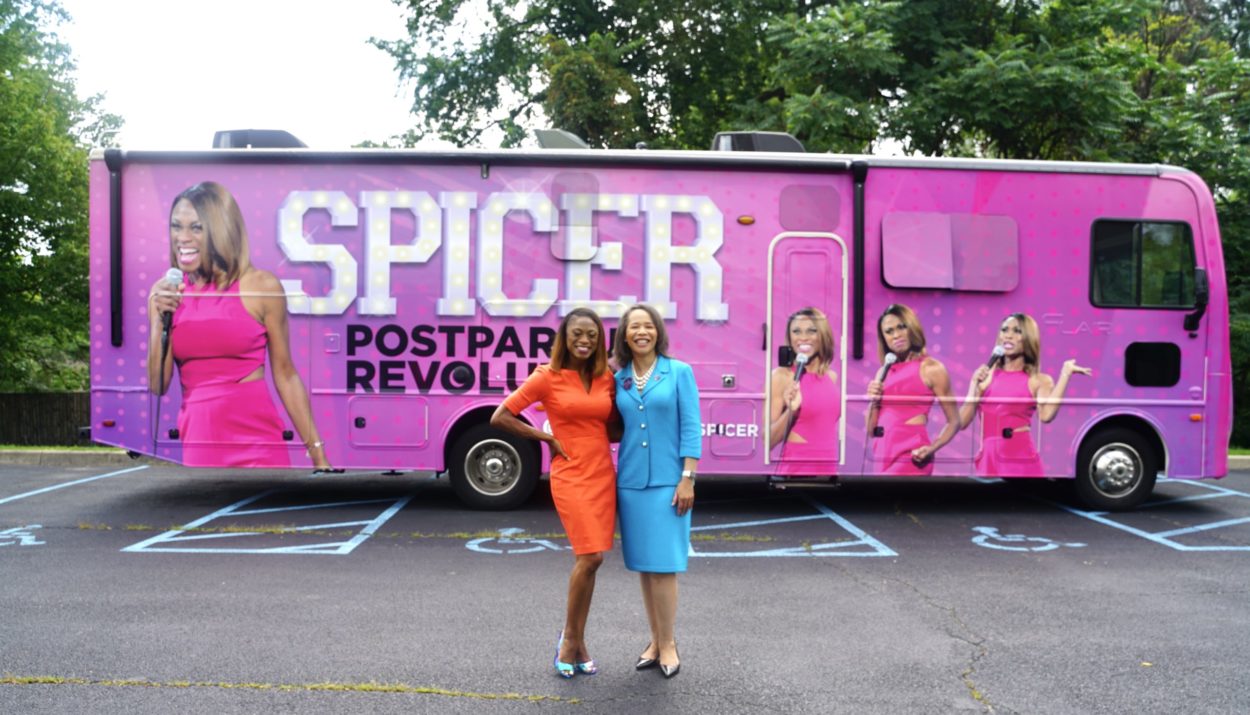
Such support and education will help ensure women gain and strengthen the skills to move forward and recover, access the resources they need to care for themselves and their families, and empower them to address their mental health struggles to reach their full potential.
“The #PostpartumRevolution’s mission is to normalize the way we talk, treat, and even joke about postpartum depression,” Spicer announced on social media. “We’re making noise, we have an agenda…we’re removing the stigma.”
The Sonia Schorr Sloan Maternal Mental Health Program is a community-based, outpatient, maternal mental health program designed to provide effective, evidence-based psychotherapy for women experiencing perinatal mood and anxiety disorders (PMADs). Women of every culture, age, income level, and race can develop PMADs, which are more severe than the typical “baby blues.”
PMADs can be treated with evidence-based psychotherapy, medication, or both. However, this level of care is often limited to well-resourced women who can pay for expensive, private, behavioral healthcare services. As a result, women with PMADs typically remain undiagnosed and untreated, suffering for weeks, months, and even years. In the most severe cases, lack of treatment is devastating for not only the mother but her family as well.
With support from JFS, women will be empowered to:
JFS Delaware is honored this program, empowering and supporting women, will carry Sonia Schorr Sloan’s name and legacy. Sonia Schorr Sloan was an iconic Delawarean who passed away in 2019. She was a civil rights activist, Democratic party strategist, and non-profit fundraiser; she was a fierce advocate for juvenile justice, women’s rights, and other causes.
Written By: Emma Driban, JFS Content Developer
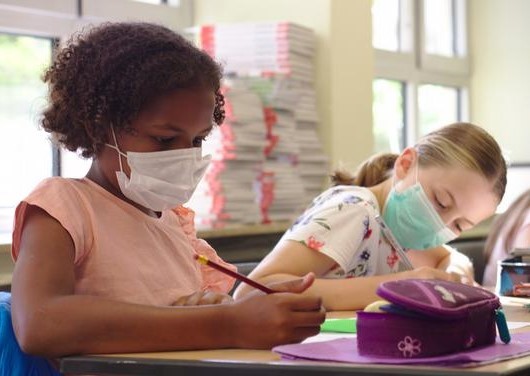 Back-to-school nerves are normal for parents, students, and teachers. After a year and a half of altered learning, people are excited to reconnect—but the first day of school has always resulted in mixed emotions. Between nervousness about new classes, sadness over the end of summer vacations, and eagerness to return to more traditional school settings, there are a lot of feelings to process for everyone involved.
Back-to-school nerves are normal for parents, students, and teachers. After a year and a half of altered learning, people are excited to reconnect—but the first day of school has always resulted in mixed emotions. Between nervousness about new classes, sadness over the end of summer vacations, and eagerness to return to more traditional school settings, there are a lot of feelings to process for everyone involved.
Here are some recommendations to help maintain and encourage good mental health as we all adjust to the coming school season.
Students of all ages may struggle with expressing their anxieties. It’s important to encourage safe environments where they can work through their thoughts and feelings. Look out for unusual behaviors or reclusiveness. Whether you’re interacting with students in the classroom or at home, you may notice changes in behaviors or increased irritability as they adjust to changes in their environments. Remaining open to conversation and helping students feel comfortable expressing themselves is a great way to remind them that it’s ok not to be ok and to help them work through it.
Exploring relaxation and mindfulness can help anyone destress after a long day. Teaching students about how they can manage difficult situations on their own or with help is an important way to help them hone those life skills. Kids and teens may find talking with friends or trusted adults, journaling, exercising, and listening to or playing music are effective ways to relax and unpack what is going on in their lives.
In addition to the physical benefits, eating well and exercising have a positive impact on mental health. Food choices affect mood, concentration, and energy levels. Exercising releases brain chemicals that make us feel good—boosting self-esteem, improving sleep and concentration, and, overall, making us feel better. It’s important to remember that everyone is unique and certain foods and exercise affect each person differently.
Getting enough sleep is important for everyone. For students, getting enough sleep contributes to focusing in class, getting good grades, and also preventing depression and other mental health issues. As a teacher of mine used to say, being “alive, alert, and enthusiastic” are key parts of learning. Most experts recommend nine to twelve hours of sleep for children aged six to twelve, eight to ten hours of sleep for teenagers aged thirteen to eighteen, and seven to nine hours of sleep for those over the age of eighteen.
While not everyone needs a fully scheduled day, following a daily routine is proven to have health benefits. From lowered stress levels to better sleep to improved self-esteem and motivation, a daily routine has a lot of influence over mental health. Waking up and going to bed around the same times each day contribute to being well-rested and add a structured frame to the day. In addition, it can be helpful for students to have a designated homework time—among the variety of activities they may have planned—to ensure it gets done. With so much going on during the day, it is also good to account for designated relaxation time. It’s easy for homework and clubs and after-school activities to feel overwhelming; including time to destress in a daily routine highlights its significance.
“Consistency, patience, and empathy are going to be so valuable as we move towards a post-pandemic world,” says Stacy Repp, MSCC, one of JFS’ school-based Family Crisis Therapists, who works with elementary school students on skill-building and behavior management. “If we survived the past year and a half, I have no doubt we will all adjust and excel this next school year as well.”
Students, teachers, and parents are all partners in creating welcoming and safe learning environments. Teaching students about good mental health practices, using words they will understand, is more important now than ever with all the changes they have experienced in the past year. Last school year saw a drastic lack of socialization and changes in classroom norms; the switch back to in-person schooling will require acclimation and relearning expectations.
If you or your student need additional support while facing the challenges of a new school year or adjusting to transitions, JFS Delaware’s talented and compassionate clinical team can help. Get started today by completing our online intake form.
Dear Friends,
Your support, partnership, guidance, and friendship means a lot to me. As CEO, building and strengthening relationships—with staff and board, volunteers and community partners, individual donors and philanthropists alike—has always been a priority to me and I am grateful for the opportunities I’ve had to get to know each of you. My experience leading JFS Delaware has contributed so much to my personal and professional development and I feel fortunate to have served my community in this way, with an organization I believe in so firmly. So it is bittersweet to share that I will be leaving JFS Delaware next month (August 2021) to continue my journey elsewhere.
I have accepted a new position as VP of Strategy and Partnerships at the Network for Jewish Human Service Agencies (NJHSA), a membership association for the nonprofit Jewish human service sector in the United States, Canada, and Israel. The Network serves as a resource for advocacy, innovation, best practices, and research. As they establish their Center for Innovation & Research, which I will oversee, this role provides an excellent opportunity for me and my family—one in which I will continue to provide care and attention to JFS Delaware, an NJHSA member.
The Board of Directors has assembled a search committee to recruit my successor. Until a new leader is selected, the Board has asked JFS’ Past Board President and experienced nonprofit executive Regina Kerr Alonzo to serve as Interim CEO. She’ll be providing support for operations, strategic planning, relationship building, our Executive Leadership team, and the Board of Directors.
I have grown so connected to you all and I have learned so much throughout my time as JFS Delaware’s CEO. We have grown so much as an agency and community and I have loved to watch our mission be carried out and made possible by so many of you who believe as we do—we are all responsible for one another. I know that, as CEO, I’ve been involved in our organization’s services and growth, but JFS is extraordinary because of each of YOU. I am hopeful and confident you will continue wrapping your arms around JFS Delaware the way you so generously and passionately have—many of you before I even joined the JFS family.
You’ve heard us say it before and it remains undeniably true: YOU help our clients and community thrive. Thank you, sincerely, for your friendship and support. I’m still always a phone call away.
Kadima! Let’s move forward.
Thank you all.
Warmly,
Basha Silverman
“On behalf of the Board, I want to wish Basha all the best as she takes on her new role with NJHSA. We are—and will remain—deeply grateful for her contributions to JFS Delaware; over the past five years, she has made incredible strides in further establishing JFS as a vital community organization that serves everyone. She has been a pleasure to work with and sets an example for many. Our Board and Executive Team has created a search committee to find a new leader for our agency to continue our progress and growth. Best wishes to Basha and her family!”—Kim Drexler, JFS Board President
“In the 10 years I have volunteered here, JFS Delaware has gone through tremendous growth, increased community partnerships, diversified funding (critical to a nonprofit of our size!) and an unceasing dedication to the highest quality services. The JFS Board and staff members are strong, smart, and compassionate and, while we will all miss Basha dearly, our organization remains in good hands…and I’m not only saying that because I’ll be the interim CEO! I’m glad for this opportunity to support JFS in a new way during this time of transition—a welcome respite from raising two confused teenage boys and living with a farmer who has chronic shpilkes! In all seriousness, thank you to Basha for her leadership and all of you who continue to support JFS.—Regina Kerr Alonzo, Interim CEO
NJHSA’s Center for Innovation & Research is designed to establish partnerships with universities, government, corporations, or philanthropists in order to develop, evaluate the efficacy of, and implement solutions to challenges identified by Network members. These solutions may be client service delivery focused or may address internal agency operations, governance, or other operating factors. The Network’s Center for Innovation and Research is a catalyzing effort to support Network member agencies as they work to advance solutions to challenges through the dynamic lens of innovation and social impact entrepreneurship. Ongoing training will be provided to member agencies to increase their efforts to embrace the process of innovation and to incorporate strategies and planning processes which may contribute toward innovative responses to client and community needs.
Basha Silverman, former CEO of JFS Delaware, will be assuming the newly established position of Vice President of Strategy and Partnerships. In this role, Basha will drive the overall strategic initiatives of the Network and will cultivate and implement efforts resulting from meaningful partnerships; central to Basha’s role will be her oversight, leadership, and development of the Network’s Center for Innovation and Research.
“The Network is thrilled to welcome Basha and, with her leadership, is well poised to grow the impact of the Network’s burgeoning Center for Innovation and Research.”
—Reuben Rotman, NJHSA CEO
Written by: Clarence Fluker
Originally written & published in Letters from CAMP Rehoboth
© 2021 by CAMP Rehoboth, Inc. All rights reserved by CAMP Rehoboth. No portion of this publication may be reproduced in any form without the prior written permission of the editor.
 “Navigating changing vocabulary around gender identity and sexual orientation requires that we offer ourselves and others grace. Grace affords us the opportunity to educate and be educated, and it can help us stitch this beautiful and diverse quilt of community together.”
“Navigating changing vocabulary around gender identity and sexual orientation requires that we offer ourselves and others grace. Grace affords us the opportunity to educate and be educated, and it can help us stitch this beautiful and diverse quilt of community together.”
I spent more than 20 minutes on the phone with a friend last week, searching the internet and discussing the definitions of the terms non-binary, gender fluid, and gender- nonconforming. That impromptu research session was spurred on by the proclamation of another friend less than a week before. Their announcement made us realize that neither of us was sure that our understanding of those terms was correct. We had a friend who was evolving, and we knew we had some learning to do.
Before we peppered our friend with too many questions that they may not have been comfortable answering, we wanted to educate ourselves. Because we care, we want our friendship circle to be a place for understanding, celebrating truth and belonging.
That is the purpose of friendship and community. I acknowledge it is not always easy—not because of lack of will, but more often because of a pure lack of knowledge.
Several years ago, I moderated a table discussion with LGBTQ+ high school and college students. It was a lively conversation until I made a critical mistake, one that caused a moment of silence and a flurry of nervous eyes darting across the table. I was at a loss. Things seemed to have been going so well until that point. I did not know then what had broken the flow. Finally, one student spoke up. I had used the wrong pronoun in directing my last question to a student. Embarrassed and heartbroken that I had offended her, I apologized to her and the entire group. Then I reset the table by asking each of the students to share their preferred pronouns. Thankfully, the student and her peers offered me grace. That situation was a teachable moment for me: I had much more learning to do.
Over the last 20 years, I have witnessed the once universally accepted acronym GLBT evolve, from GLBT to LGBT to LGBTQ to LGBTQIA and, even more recently, to LGBTQIA+. Depending on who you ask, the Q could mean questioning, or it could mean queer. Two-Spirit and same-gender-loving (SGL) folks are sometimes forgotten altogether. I typically identify as gay on surveys if SGL is not listed as an option, though it was my preferred term for years. I know that there are people in the community who have never even heard of SGL. Many are not even familiar with Two-Spirit.
The language we use to identify ourselves is personal and often influenced by our generation, geography, race, social circles, ethnicity, and other factors. The language we use to describe our sexual orientation and gender identity evolves by how it is understood in society, just as it does for every individual based on where they are in their journey. When I was in college, none of my friends ever used the word queer. In fact, we would cringe if we heard it. Today, it seems to be embraced by many.
Language, definitions, and ideas around sexual orientation and gender identity are fluid and constantly changing. Within and outside of our community, people—even those with the best intentions—will not always get the language or definitions right. It is okay not to know what word to use or what a phrase means. However, it is not okay to ignore someone’s preferred pronouns for the sake of expediency or personal disinterest. Furthermore, it is not okay to simply disregard someone’s feelings or be intentionally disrespectful of how someone shows up in the world and takes claim over their own identity. And it is not okay not to care. We should all care and commit to doing our best.
Navigating changing vocabulary around gender identity and sexual orientation requires that we offer ourselves and others grace. Grace affords us the opportunity to educate and be educated, and it can help us stitch this beautiful and diverse quilt of community together. There will be times when a person or group does not get it right. It could very well be you. But in those instances, we should allow for some learning and extend some grace.
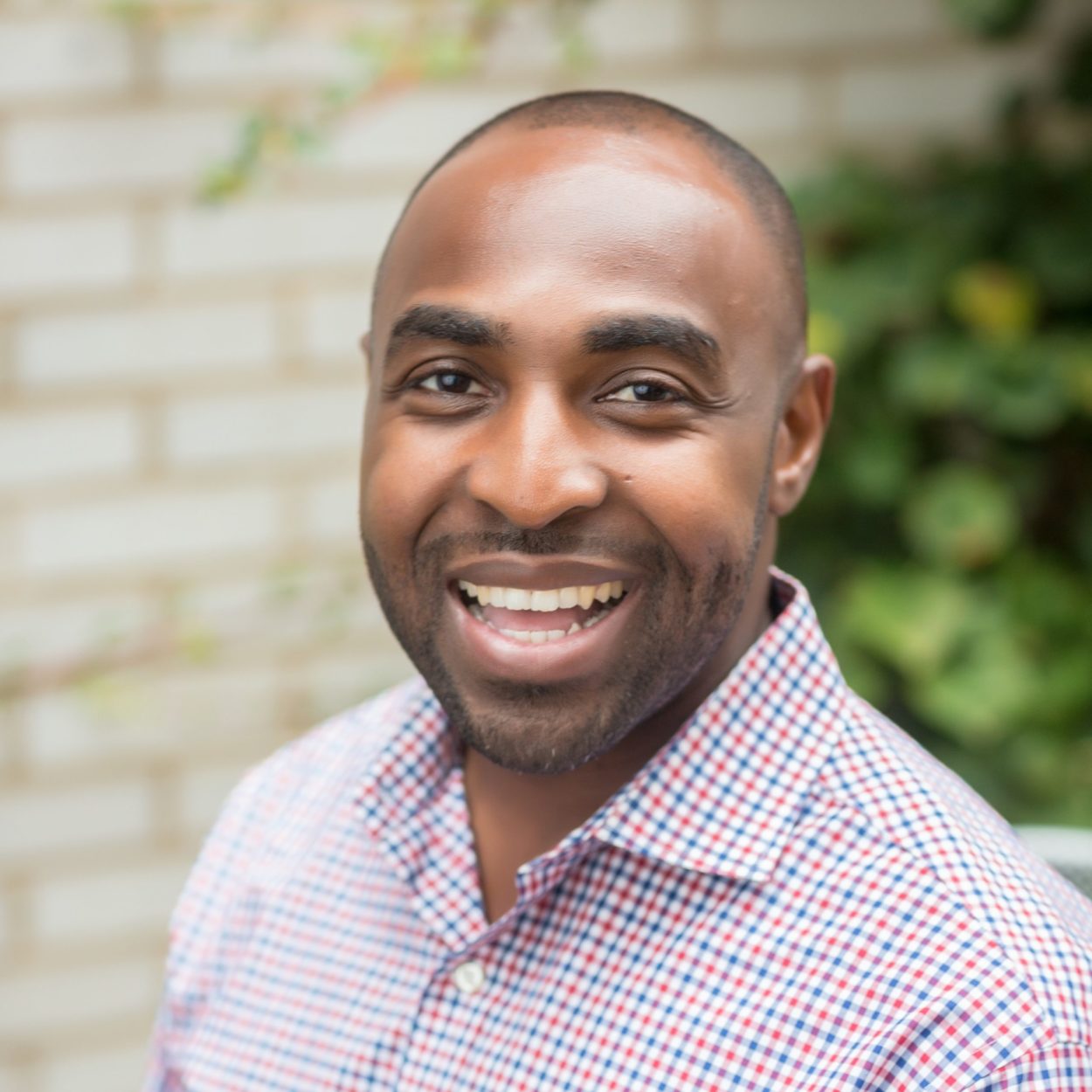 Clarence J. Fluker is a public affairs and social impact strategist. Since 2008, he’s also been a contributing writer for Swerv, a lifestyle periodical celebrating African American LGBTQ+ culture and community.
Clarence J. Fluker is a public affairs and social impact strategist. Since 2008, he’s also been a contributing writer for Swerv, a lifestyle periodical celebrating African American LGBTQ+ culture and community.
Follow him on Twitter: @CJFluker or Instagram: Mr_CJFluker
CAMP Rehoboth is a nonprofit community service organization dedicated to creating a positive environment inclusive of all sexual orientations and gender identities in Rehoboth Beach and its related communities. They seek to promote cooperation and understanding among all people, as they work to build a safer community with room for all.
Letters From CAMP Rehoboth is a program of CAMP Rehoboth Inc., published 15 times per year, supporting the nonprofit’s purpose and mission.
Learn more at www.camprehoboth.com
On May 7th, 2021, the North Wilmington community experienced a profound loss when Metastatic Breast Cancer took our brave, generous friend and fierce advocate, Erica Wright.
For those of who attended last year’s Virtual Annual Meeting, you may know you remember our remarkable guest, Erica Wright. Erica courageously shared her extraordinary story of weaving work, motherhood, and advocacy into her everyday life after receiving her cancer diagnosis. Erica was instrumental and inspiring to all of us at JFS and Cancer Care Connection when merging our two organizations. In addition to her service as a brave and relentless patient advocate, she invited JFS into her life — gifting us the opportunity to serve her and her family when they needed us most.
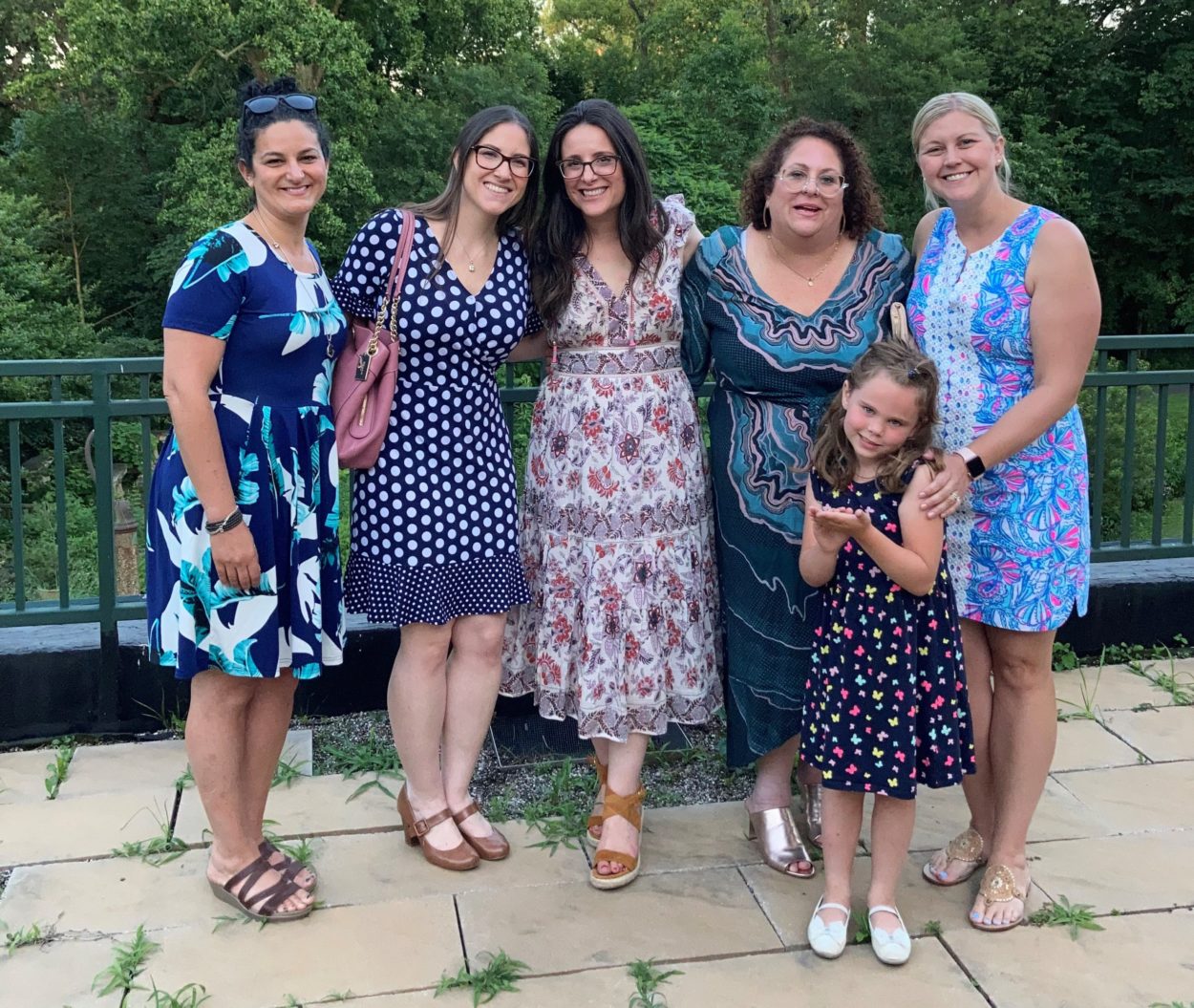
Erica’s friends and daughter, Isobel, at JFS Delaware’s 2021 Annual Meeting.
The Erica Wright Advocacy Award will be granted annually to recognize a woman in Delaware who has demonstrated exceptional courage, resilience, and leadership, often at great personal risk and sacrifice. Together, JFS and Erica’s family and friends will share the responsibility for reviewing nominations and selecting this award’s recipient each year. We are grateful to create this award to honor Erica’s legacy and, this year, JFS presents the first annual Erica Wright Advocacy Award to Erica Wright, in loving memory. Erica put forth relentless effort and determination to spread awareness, fight for more research dollars spent specifically on Metastatic Breast Cancer, and create better outcomes for future Metastatic Breast Cancer patients, all while maintaining her own health, marriage, and motherhood.
We humbly presented this award (a music box) to her husband, Joe Wright, and her daughter, Isobel Wright on June 17, 2021 with friends and family as witness.

Written by: Emma Driban, JFS Content Developer
In June of 2020, JFS Delaware formed an official Equity Diversity & Inclusion Committee with a mission to prioritize social justice and dismantle systemic inequalities – internal and external to our agency – through advocacy, allyship, and action. This diverse group of staff members have provided thoughtful direction, feedback, and structure to our entire team to support one another, educate ourselves, and dismantle racist practices, policies, beliefs, language, and behavior; through ongoing dialogue, education, collaboration, and action, we carry out our goal to combat injustices in our offices and community.
To date, the committee has made consistent efforts to provide trainings, initiate discussions, and provide resources to promote understanding and allyship among our staff; below are some tips for LGBTQIA+ Allyship that have been shared and discussed during Pride Month.
Thank you to Becca McAdams, M.Ed., LPCMH, member of JFS Delaware’s EDI Committee, for her contributions to creating this piece.
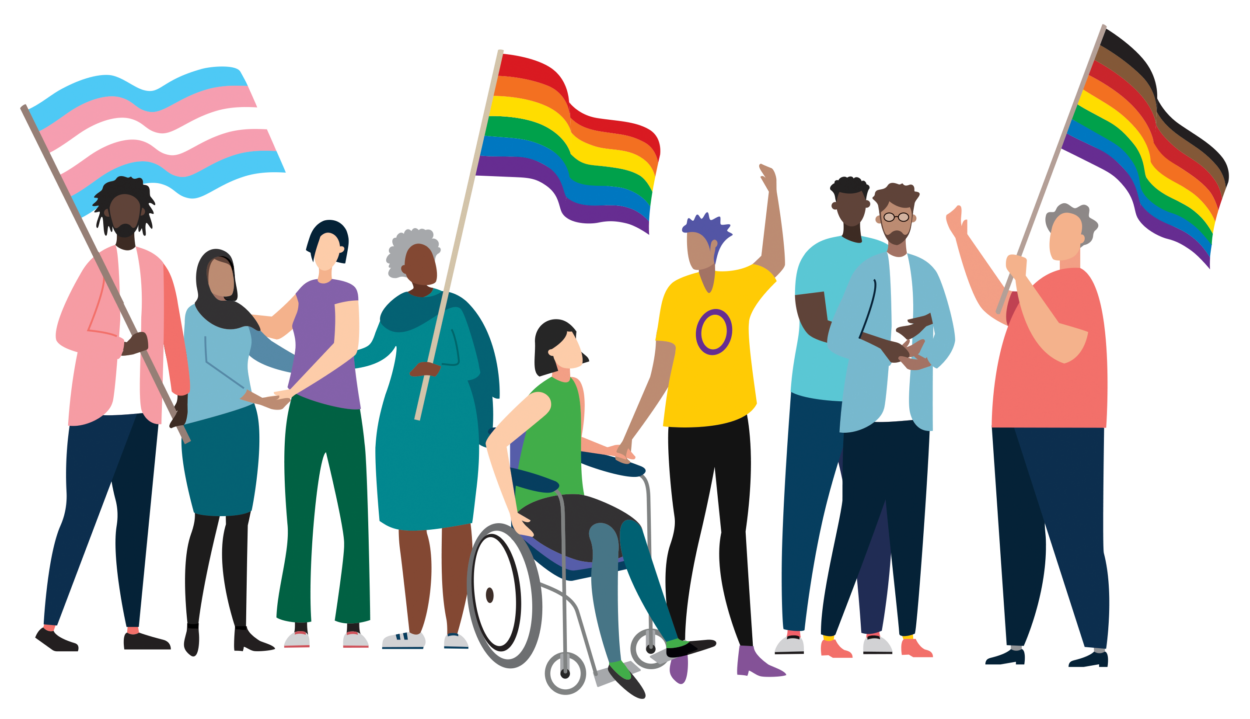
What does it mean to be an Ally to the LGBTQIA+ community? It is important for Allies to have the desire to learn and understand, to help LGBTQIA+ people feel supported and included, as well as to address barriers to fairness and justice for everyone.
There are many ways that Allies can show support and advocate for the LGBTQIA+ community. In that support, it’s important to remember that every person is an individual and looks for Allyship in different ways.
Below are ten tips on how to be a LGBTQIA+ Ally:
“Be open and kind, ask questions & remain curious, provide knowledge to others, foster safe communication.” —Jess from @SoYouWantToTalkAbout
For more information about how to be a good ally, check out the resources below:
Written by: Emma Driban, JFS Content Developer
June 20 is World Refugee Day—an annual, global celebration of the contributions, courage and resilience of refugees—and JFS’ Refugee Integration Support Effort (RISE) has not been idle during the COVID-19 pandemic. While the virus brought many things to a halt, the need for refugee resettlement and assistance did not go away, and Jewish Family Services was there to help.
The RISE team has continued to provide intensive case management to its clients. This includes employment services such as professional skills development, employment searches, assistance with documentation and applications, transportation to interviews, and more; financial literacy and planning; life skills training and cultural orientation; English language lessons; health and wellness management; and connections to resources, service referrals, and assistance with benefits and more.
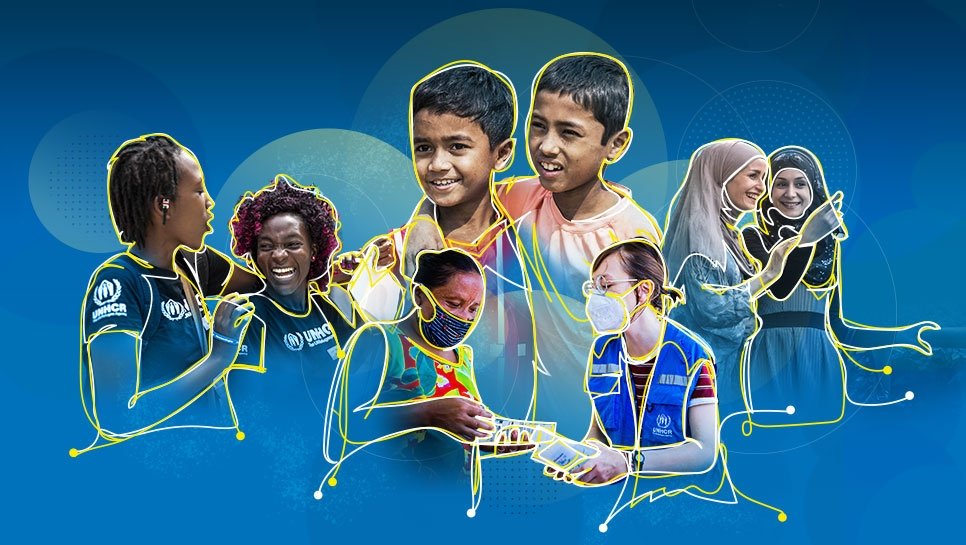
These offerings help clients with their resettlement and aid them in reaching their goals. In the case of one client, RISE assisted in overcoming employment and financial issues. The client persisted through difficult times with support from RISE and enrolled in Delaware Technical Community College, where they maintain high marks despite the challenges of an online learning system. In their pursuit of a pre-medical degree, they have sought out mentorship from a JFS Case Manager, become a Certified Home Health Aid, and got a job as a Direct Support Professional; they also received a driver’s license after several attempts. The client’s perseverance, with some help from RISE, has seen them strive for their goals and accomplish quite a few.
In addition to the case management services, with generosity from community members and partners, the RISE team supported clients through COVID by distributing thirty-two Chromebooks to nineteen households, allowing the families to participate in online worship services, attend telehealth appointments, participate in virtual learning, and communicate with case managers. They also acquired an English learning software to offer an alternative to closed ESL programs that help clients who are continuing to work on their English and applied for emergency response funds to assist clients affected by the COVID crisis with bill payments and other critical expenses.
These emergency funds from partner agencies such as the United Way and HIAS helped clients and families maintain or regain self-sufficiency during these challenging times. One RISE client received this financial aid when a recent job loss and the impending birth of a child sent the family into crisis mode. Their case manager helped them send in benefits applications through the state and connected them to various programs within the community to help prepare for the baby. With RISE’s help through the job search, the client found an employment opportunity and is on their way back to independence and peace of mind.
During the pandemic, RISE also hosted a Mental Health Psychosocial Support Group, which engaged many clients for networking opportunities and cultural support. RISE also created a Virtual Women’s Support Group, in which a small group of clients attended weekly sessions for eight weeks; guest speakers from the financial, educational, and mental health fields came into the group to talk about topics in financial literacy, the American educational system and being the best advocate for your child’s success in school, and other relevant topics relating to the best way to stay connected during COVID. RISE aims to support its clients however it can through the struggles of resettlement.
One client experiencing a hard time adjusting to the United States was also struggling with familial and employment issues. These circumstances took quite a toll and, over the course of several months, JFS was able to help them put the pieces of life back together. The client shares that the support, understanding, and compassion from the JFS staff contributed to their spiritual, emotional, and mental health.
One in eleven Delaware residents is an immigrant, while another one in eleven residents is a native-born U.S. citizen with at least one immigrant parent. Since 2017, JFS has helped resettle fifteen families, a total of fifty-nine individuals. JFS believes we are obligated to love, befriend, and welcome the stranger and to treat all of humanity with kindness and dignity. We deeply understand the human tragedy that occurs when nations and citizens turn a blind eye to those who are fleeing persecution, war, and terror. With just 11,800 individuals arriving in the United States, 2020 saw the fewest refugees since the establishment of the refugee admissions program in 1980; the current administration has recently raised the refugee admissions cap and JFS RISE looks forward to resuming our active resettlement efforts this year.
In partnership with HIAS—one of the nine national resettlement agencies—and the State of Delaware, JFS works diligently to support incoming refugees. The RISE team includes JFS professional staff and JFS RISE volunteers, community partners, and integration leaders. Through intensive, culturally sensitive case management, our staff enables refugees to integrate into their new communities, obtain and retain employment, and maintain healthy lifestyles to achieve self-sufficiency.